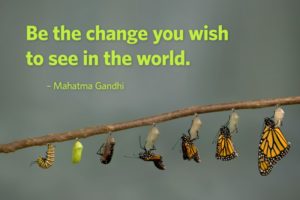You may feel that there is so much harm in the world you feel helpless and you’d rather just not think about it. But when we breathe into the discomfort and acknowledge it without letting it consume us, we develop the clarity we need to change what we can and we become stronger, more resilient, and more compassionate through the practice.
Choosing a practice of humane living is simply about choosing to move through life with eyes open, seeing and acknowledging the harm that is in the world, learning about our part in it, and letting our compassion direct us in response to that harm.
Do not be daunted by the enormity of the world’s grief.
Rabbi Tarfon (translation from the Talmud)
Do justly. Now.
Love mercy. Now.
Walk humbly. Now.
You are not obligated to complete the work. But neither are you free to abandon it
Resist apathy, Cultivate mindfulness
Apathy is a lack of interest, enthusiasm, or concern about things that matter. It’s easy to shut down to the vastness of the problems of the world. Apathy closes us off from our heart and it prevents us from living fully and experiencing healthy joy.
We can resist apathy by cultivating mindfulness and by nurturing our curiosity and also by remembering that we are not responsible for fixing all of the problems. A practice of mindfulness can help us learn to open our hearts and minds and to find our true compassion. That compassion will direct us in our connection with life.
- Mindfulness and Compassion
- Mindfulness Daily with Tara Brach and Jack Kornfield (a free introduction to mindfulness practice by two of the foremost leaders in the practice today.)
The value of simplicity
To practice simplicity is to minimize the complications, excesses, and background “noise” that can make us feel frazzled and distracted, leaving us unable to focus on the things that truly matter to us. The commercial interests of the world recognize the powerful wealth of our attention and they aim to grab as much of it as they can – securing that power for their own benefit. Only when we clearly realize this, can we begin to reclaim and to carefully choose where and how we want to spend our attention.
Time, energy, and attention are precious gifts with which we make our mark on the world. A practice of simplicity allows us to use these gifts in ways that will offer the most according to our needs and hopes.
Simplicity, Patience, Compassion.
Lao Tzu
These three are your greatest treasures.
Simple in actions and thoughts, you return to the source of being.
Patient with both friends and enemies, you accord with the way things are.
Compassionate toward yourself, you reconcile all beings in the world.
Developing habits
So much of the harm done in the world is due to habits. Each time we “practice” a negative habit, thought, or belief it grows stronger. So how can we change our harmful habits and beliefs into habits of compassion? Practice, gentle, ongoing practice.
The more we do, the easier it becomes. And the more we find others who share that passion and can help us along the way, the more fun and rewarding it becomes.
As we practice making changes, however small, and keep that practice going we find that it gets easier and we see the benefits of our practices. Healthy, compassionate communities will naturally support healthy relationships to each other, animals, and to the surrounding environment of plants and earth.
“The most straightforward advice I can suggest to make real concrete changes in your life is to practice causing no harm to anyone—yourself or others.”
A simple way to avoid hurting other people
DARE to be “the Change”
If you choose to engage in practices to reduce harm and promote welfare across these key areas in our lives, you may find yourself frequently feeling differently from those around you.
- When others belittle and condemn someone on social media, you may find yourself holding your tongue or gently attempting constructive dialogue.
- When your friends are gleefully tossing live lobsters or crabs into the pot to cook, you may follow your discomfort and choose not to participate.
- When work buddies are thoughtlessly tossing away plastic drink bottles, you may be choosing to use your own reusable bottle or be careful about where you discard your bottle.
- When your gardening friends are delighting in the health and vigor of their non-native, fertilized landscapes, you may be learning the joys of developing your wild native landscape that supports wildlife and pollinators.
Our cultural habits lock people into patterns of causing and justifying harm. But we can value the courage of standing apart for something we believe in without having to diminish others.
Humanity is evolving in the direction of less harm and a better understanding of how harm affects the whole. But we have long way yet to go. Don’t hesitate to mark your own divergences from harmful cultural norms as the achievements that they indeed are, as marks of your evolving humanity. And may your accomplishments bring you joy!

An interview between Krista Tippett, creator and host of On Being, and Brené Brown, research professor at the University of Houston, provides a valuable discussion that encompasses many facets of our challenges and hopes in living with compassion. We recommend listening to this interview for more insight and thoughts about embracing a life of compassion.
“…we need moments of collective joy, and we need moments and experiences of collective pain. We need to find ways to come together in those moments.”
Brené Brown — Strong Back, Soft Front, Wild Heart | The On Being Project